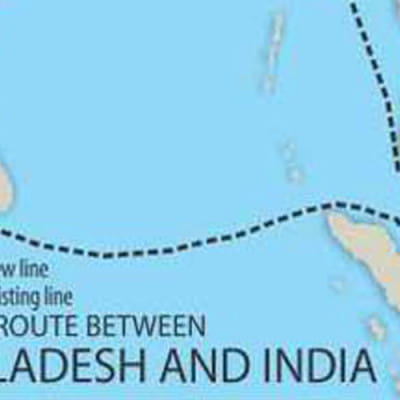Cost of shipping to India set to drop


Bangladesh and India have signed a draft agreement on coastal shipping, a move that will reduce the cost of export and import between the two countries by two thirds.
The draft deal was signed at a meeting in New Delhi on April 20.
The final agreement will be signed during the upcoming visit of Indian Prime Minister Narendra Modi to Bangladesh, Shipping Minister Shajahan Khan said at a media briefing in Dhaka yesterday.
When the agreement comes into effect, both time and money will be saved in transportation of goods between the two countries, he said.
Bangladesh's Shipping Secretary Shafique Alam Mehdi and India's Shipping Secretary Rajive Kumar signed the draft agreement.
At present, for transporting goods between Bangladesh and India, the consignment has to be sent to Colombo or Singapore first.
It is then shipped to any port in India or Bangladesh, Mehdi said.
After the signing of the final agreement, any ship from India will be able to come directly to Dhaka and anchor in an inland port.
For instance, to import a tonne of rice from Kolkata it now costs $90, but after the signing of the agreement it will come down to $35, said SK Mahfuz Hamid, managing director of Gulf Orient Seaways, who also attended the meeting in New Delhi.
Once the deal is live, Bangladeshi ships will be able to carry goods to India, he said. Goods are now carried by foreign ships.
For coastal shipping, a draft standard operating procedure has already been prepared, which will be finalised in the next two months through negotiations between the two countries, said a shipping ministry official.
Meanwhile, Khan said the two sides agreed on several other matters for increasing trade and commerce through river routes -- including extension of Protocol on Inland Water Transit and Trade (PIWTT) -- at the meeting in the Indian capital.
The shipping secretary said the tenure of PIWTT has been extended to five years from the existing three.
The river protocol was signed under the India-Bangladesh Trade Agreement, and since the tenure of the trade agreement was extended to five years, so was the protocol tenure.
Bangladesh also proposed for allowing plying of passenger vessels in the river protocol, according to minutes from the meeting.
Mehdi said if it is agreed then Bangladeshi passengers will be able to travel to India through river routes at a low cost.
"It is not possible under the existing river protocol," he said, adding that the country would send in a separate draft agreement for that end.

 For all latest news, follow The Daily Star's Google News channel.
For all latest news, follow The Daily Star's Google News channel. 



Comments